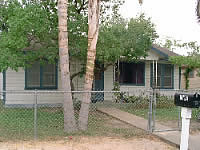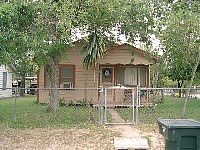7/1/02
Guelo
(Page two)...
My brother and I stayed up eating Whataburger and hung out a bit. Then I went to bed, knowing it was going to be just a few hours before we'd be burying Guelo.
In the morning, we hurried over for the viewing. It was at a small funeral home in South Weslaco. When we arrived, my uncles were there, in white gloves -- pallbearers. They shook our hands and hugged us as we arrived. Some of them were crying openly.
We made our way inside, and Guelo was there, in the front. The silver coffin was open. I could see the outline of his face. There were arrangements of flowers everywhere. Lots of people I didn't recognize; older people who I assumed were distant relatives or friends of his. Most of my immediate family was in the front few rows. My grandmother was already there; she and my granddad had left earlier. We said hi to all the relatives. Then we passsed the coffin itself.
Guelo looked so small, lying there. His hands were dark, mottled with patches of purple. His face was still, his mouth drawn down at the corners. His hair, the distinct white/gray, was combed back neatly. He looked short. I always thought he was so big. I grew up looking up at him, even when he was sitting down. Even when I was grown and towered over him in height, I never thought of him as less than a giant.
What got me was the hat. The clean, tan cowboy he'd had was in the coffin, next to him. He was always wearing a hat like that, all my life, for as long as I knew him. Seeing it there with him, the one piece of clothing that I always did and always will associate with him; that broke me down. The tears stung my eyes. We sat in the rows and waited as the rest of the family saw him.
It was like that for the rest of the morning. We greeted family, and later got up and prayed, two-by-two, kneeling in front of the coffin. My brother and I went. I don't remember what I prayed. I didn't ask what my brother was thinking. We looked to Guelo one more time, both of us quiet, then went back to our seats. We didn't look at each other.
They escorted us out of the funeral home, but before we left, my great aunt and my grandmother, Guelo's daughters, started crying hard next to the coffin. They are two of the strongest women I've ever known. I'd never seen them cry like this.
The hearse and the limousine were waiting outside. They took eight family members in the big car. The rest of us followed in procession.
We went to the church. My cousins read prayers. We stood up and sat down again then stood up about 20 times in the rote tradition of Catholicism that I don't know I'll ever really understand. A guitarist played and sang. Most of the family sang along to the hymns.
I was holding the eulogy in my hands, in a manila folder. It was two pages, neatly word processed. My great aunt and uncle and my cousin had written it. Because I have trouble reading anything out loud I don't edit a million times over first, I'd gone through it the night before, making changes in pencil. They told me they wanted me to do that -- to personalize it however I wanted to and use what I could. By the time I finished, I had a hash of strike-throughs, additions and marks. I kept worrying that I wouldn't be able to read my own writing, or that I'd read things in the wrong order, forgetting to follow my own little arrows to keep my place. Or worse, that people would be upset by the changes I made.
When it was time, my great aunt and grandmother turned to me, gesturing for me to go up there.
I stood at the podium, with the little microphone, and I took a long look at my family. My aunts, my uncles, my parents, cousins, grandmother and grandfather, little kids who didn't fidget, not even a little bit as I looked out there.
I read slowly. I tried not to be cute or to rush through. I emphasized certain words. When I got the second-to-last paragraph, the one that I wrote, my voice finally gave. Every time I thought about that paragraph, sitting in the pew preparing, I choked up. It happened again when I read it out loud. My voice quavered at the last sentence. "I thought he'd be there forever."
I got through the last paragraph quickly and got out of there. I went back to my seat and my great uncle told me I did a good job.
You can read it here.
The service was over soon after that. On my way out, the priest shook my hand firmly and said he liked the eulogy. I still had tears in my eyes. I wanted to rub them away. Instead, when they took us out, the sun dried them on my face.
We went to the cemetary.
It was hot. Huge palm trees waved in the meager breeze. The gravestones: some were elaborate monuments, others simple crosses. So many of them were in pairs, husbands and wives buried together.
I was told that Guelo was going to be buried near my grandfather and next to my great grandmother.
Everyone cried. My cousin was the first to put dirt on the coffin. He and I used to play in his back yard and chase each other around. He's grown up. We all are. We're so much older now.
A prayer was read. A line formed to hug and say goodbyes to the closest of the family. Mariachis played. As they did, my brother, my dad and I held my Mom, who was crying softly. We stood there like that, all of our three arms at her back, as they played three songs.
We walked away in that heat, away from the bright green temporary carpet, back toward our cars, away from the silent hum of the drop/lift that lowered the coffin deep into the ground.
Later that day, after my parents were gone, my grandmother and grandfather told stories about their growing up, stuff I'd never heard before, information I'd never asked about. My family was made of migrant farmers. They used to work in Minnesota, Arkansas, Mississippi, Missouri. They picked cotton. My great grandfather used to work up in Dallas, coming down every few weeks for one day at a time, to see the family and give them his paycheck. He never mailed a paycheck. He always brought it himself.
They told me about the time that my great grandmother and my grandfather bought the two neighboring lots where they would build their homes from a developer from San Antonio. How all there was to do was tell stories or listen to the radio. Sometimes, my grandmother said, they would block off the road (nothing but dirt then) and people would go outside and dance. All you needed was a guitar and a singer. People would dance.
They worked in pharmacies, dispensing milkshakes and Cokes. They saw movies for a quarter.
"The one thing I remember was we were always happy," my grandmother said.
I keep hearing that Guelo had this great sense of humor, and I vaguely remember him always joking, always teasing my dad. My whole family shares that. He gave that to us, I think. This wonderful gift.
I wish I had known him. I didn't, really. I was there and he was there, but I didn't truly know who he was. I didn't know where he came from, how he lived, where he'd been, what he thought of his life. I never asked these questions. Now I can't.
But when my grandmother tells me how happy they were, I can't believe it's just the glossing over of time and nostalgia. I think Guelo worked hard and I think he made a lot of people very happy. He made a lot of people laugh for so many years.
He gave us all this. Toward the end of his life, he only asked that he be able to die at home. The doctors didn't let that happen. We couldn't help him.
I hope he would have been okay with that. I hope he knew how much we all loved him and how even those of us that could have known him better, who should have spoken up a little more and listened a lot more, won't forget.
I won't forget, Guelo.
 ...
... Grandma's house.................................... Guelo's house. |
 | |||||||
 |
 |
||||||
 |
|||||||
 |
|||||||
 |
|||||||
 |
|||||||
 |
|||||||
Clip
Art Corner
...will be back next time.